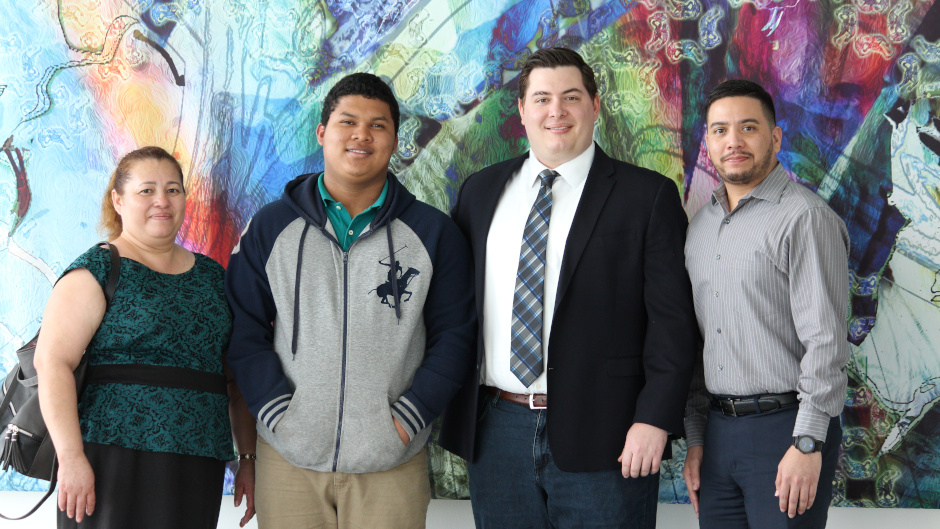Amilcar Martinez and 3L Andrew Sarangoulis come from different worlds. Martinez grew up in Honduras; Sarangoulis in Reading, Pennsylvania. The two crossed paths through the Health Rights Clinic at Miami Law.
But they have a couple of things in common. Both are working on their language skills. Martinez, 16, is learning Spanish and English; his native tongue is Miskito, a language of the indigenous people of eastern Honduras. Sarangoulis, 24, has been learning Greek, these days. They each have two brothers - Martinez is the youngest, Sarangoulis is the oldest.
Even though they don't have a fluent language in common, neither will ever forget the other.
Martinez has lived a very, very hard life. The Honduran native spent much of his childhood cycling between enduring periods of abandonment by his mother and cruelty at her hand.
Sarangoulis grew up playing football and lacrosse and dreaming of the day he would be a lawyer. He loved to read and write, and spent his summers working at the law firms of his friends' parents. At Penn State, he double majored in philosophy and criminology.
Suffering in Honduras
When Martinez was three, his mother snatched him from his father and brothers and took him to a crime-ridden and poverty-stricken area of Honduras. For nine years, Amilcar’s father could not find his son. While living with his mother, Amilcar, who suffers from a hereditary defect that left one side of his body weakened and one hand underdeveloped, was not allowed to attend school, was forced to fish for his mother’s profit, and care for her other children. He was denied food and abused by her boyfriend.
In 2011, Amilcar’s mother abandoned him again. He eventually reunited with his brothers, but their father had gone to the United States; however, he was able to send money for their care. The three brothers bounced between one bad family situation to another, and finally, with no better option, they returned to their mother and her vicious boyfriend to live.
The arrangement was short-lived before their mother again abandoned them. Other living accommodations followed, including a stint with an aunt who married a drug trafficker -- who also abused them and forced the brothers to participate in moving drugs inside the region.
Journey to U.S. and connecting with Miami Law
Their father, having run out of safe and secure options in Honduras, eventually was able to pay a coyote to bring the two younger brothers to the U. S. border. Their older brother had already made the journey.
The young brothers, then 13 and 15, traveled more than 2,000 miles from Puerto Lempira, Gracias a Dios, Honduras to Hidalgo, Texas, a border town in Texas, where they were picked up by the Department of Homeland Security. They traveled by train, by truck, and they walked long distances over more than two weeks.
The family was reunited in Miami, joining a stepmother, their older brother, and two stepbrothers. A serendipitous trip to the University of Miami Pediatric Mobile Clinic for shots for school connected the family to Miami Law's Health Rights Clinic interns.
Lifetime goal to be a lawyer
When looking at law schools, his focus was on Florida; he has family in the area, and his parents are moving to South Florida. As a 1L, he started interning at the health rights clinic, and Martinez was one of his first cases.
"I joined the Health Rights Clinic because I wanted practical training, after having Professor Newman for civil procedure,” says the Writing Dean’s Fellow. "Amilcar's case got me hooked. Initially, we were trying to get him a dependency order, with which Amilcar could more easily obtain green card status. Unfortunately, given the current legal climate in Florida, we were unsuccessful, even in our appeals, which we tried to fight all the way to the Florida Supreme Court."
Fighting for client’s rights with asylum
Even though it wasn’t always easy, Sarangoulis would not let go. There were impediments all along the way. The only Miskito translator he could find was through the University of Texas, though she often wasn’t available. Amilcar, because of his disabilities, has difficulties communicating. But, with the help of Albert Arguello, the legal assistant in the clinic, and the Honduran teenager’s father, the case continued on.
As JoNel Newman's research assistant, Sarangoulis tried a different tack: filing an asylum claim, establishing that Martinez suffered abuse, abandonment, and neglect in his home country, which was approved by the Miami office of the U.S. Custom and Immigration Services.
"Drew worked extremely hard as both an intern and fellow to assist Amilcar obtain immigration status. Even when not formally enrolled in the clinic, Drew dedicated significant time to Amilcar’s case on a voluntary basis," says Newman, director of the Health Rights Clinic. "If not for Drew’s steadfast commitment to fighting for Amilcar's rights, Amilcar would almost certainly have been deported back to the horrendous environment that he fled in Honduras.”
Being creative and never giving up
"Working with Amilcar has shown me that one person really can make a difference, and I hope in the future that I can use my law degree to continue helping others,” said Sarangoulis.
In the meantime, Sarangoulis is celebrating his win with his family (his younger brother is a 2L and an intern at the Health Rights Clinic) and fiancée/middle-school sweetheart, who is a research associate at the Miller School of Medicine.
"Amilcar’s case has taught the importance of being creative, even when it appears that there are no options left. At the beginning of the year, we thought we were going to be arguing on behalf of Amilcar at his deportation proceedings. Fast forward six months, Amilcar has legal status in the United States and is on the path to citizenship," says the Articles and Comments Editor of the University of Miami Law Review.
"Regardless of where I end up in the future, I will always be committed to the pro bono work I learned at Miami Law."

